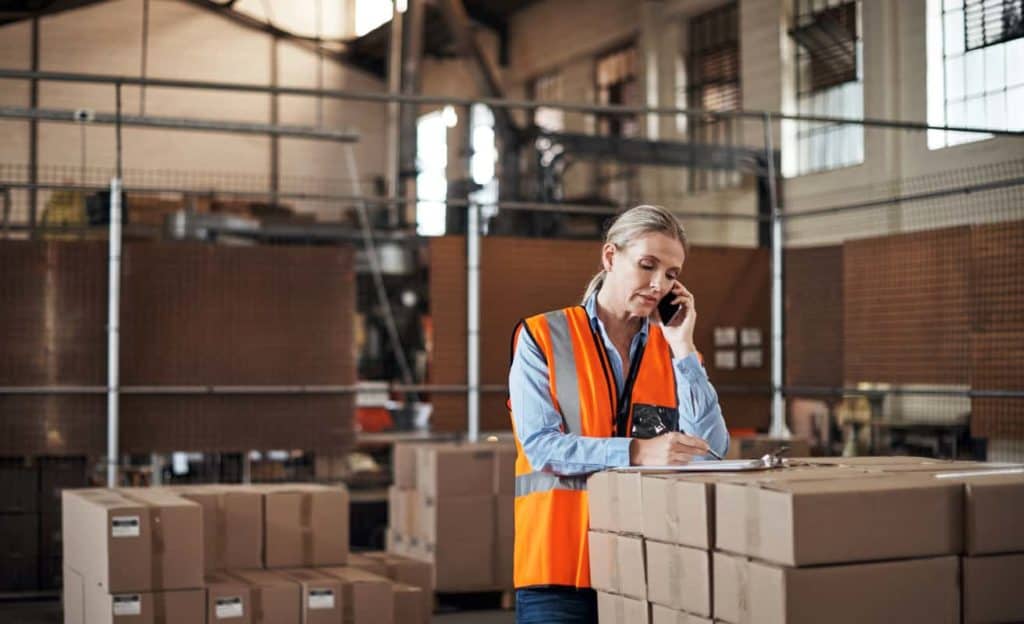We currently find ourselves smack-dab in the middle of a global crisis unlike any most of us have ever seen with our own two eyes. From mandatory lockdowns and social distancing to stock market nosedives and product shortages (finding toilet paper and bread is an ever-increasing challenge these days), COVID-19 has dramatically altered our everyday life in the short-term, and will no doubt influence the way we structure our lives moving forward. Having not yet reached the other side of this crisis, a lot of uncertainty remains in the world. But one thing seems certain – not a single square inch of our society seems to be untouched by the devastation taking place.
While only time will tell the long-term consequences of this deadly virus, the warehousing and fulfillment industry has also been significantly altered by COVID-19 in the short-term. To see the immediate impact, look no further than the actions of the world’s largest online retailer and arguably the most intimidating fulfillment and shipping force around today – Amazon.
Fulfillment by Amazon is Suspended for Non-Essential Items
Due to COVID-19 response, Fulfillment by Amazon (FBA) warehouses will no longer receive non-essential inventory through April 5th, 2020. As a result, countless online merchants that rely on Amazon sales will see their businesses impacted by this change – forcing them to choose an alternative path for fulfilling any orders to their customers.
The product types that can be fulfilled through Amazon FBA are as follows:
- Baby
- Health and Household
- Beauty and Personal Care
- Grocery
- Industrial & Scientific
- Pet Supplies
All other product types will have to fulfill orders on their own, or will have to quickly secure a third-party fulfillment service to perform all fulfillment and shipping of orders. According to recent studies, upwards of 66% of Amazon sellers use FBA, so the number of affected merchants is undoubtedly large. That leaves only one-third of all Amazon merchants with a fulfillment solution already secured and at their disposal.
We included a copy of the entire notice at the bottom of this post.
Non-Essential E-Commerce Product Sales Taking a Significant Hit
According to one of our most recent surveys, fulfillment companies are reporting an average decline in order volume of 18%, with some companies seeing upwards of 60-80% losses in order volumes. Some sellers of nonessential goods have seen their sales drop by 40-60% on Amazon lately due to the virus. The length of the slowdown will no doubt influence whether or not these merchants will be able to weather the storm and continue operations.
There has been no word yet on the suspending of professional subscription fees and other costs of doing business on Amazon, and sellers are no doubt looking at all options to sustain the short-term financial impact of the virus. Similarly, for consumers, there has been no indication of whether or not Amazon will refund or discount Amazon Prime fees despite the fact that non-essential prime shipments may take a month to deliver.
Finding an Alternative to Fulfillment by Amazon
For merchants that need to self-fulfill orders (otherwise referred to as Fulfillment by Merchant), there are a couple of options. First, online sellers can fulfill orders themselves. While this is a viable option, it has a number of challenges, including the ramp up required to implement physical shipping of orders (obtaining all of the supplies and software needed to execute this strategy) as well as shifting time away from other core functions to spend time picking, packing and shipping orders. Especially during these critical times, allocating management time towards core functions is imperative.
Second, and more easily implemented, merchants can choose from a wide variety of 3rd party fulfillment companies to store and ship products. The benefit to this strategy is that fulfillment companies are an “essential service,” meaning they have to remain open during the shutdown in order to deliver products to consumers. Furthermore, fulfillment centers are very well versed at integrating with Amazon and can quickly and seamlessly transition order fulfillment operations. In the short-term, Amazon Prep fulfillment companies offer another viable option as they are used to performing Amazon fulfillment services direct to Amazon’s DC’s and oftentimes also handle direct to consumer shipping directly for orders placed on the Amazon network.
But online merchants that use FBA aren’t the only businesses affected by Amazon’s most recent limitation on shipping of orders. New sellers aren’t currently able to send product to Amazon’s fulfillment centers, and therefore have to find an alternative.
If you find yourself looking for a viable fulfillment warehouse to ship your Amazon orders, please contact us today and we can quickly short-list the best options for your business. We know which companies are still operational, and can help you find a reliable option to store and ship your orders both during this crisis and beyond. Furthermore, stand alone fulfillment companies offer many benefits over FBA for sellers – from lower price structures to enhanced communication and more flexibility for packaging. We have a wealth of information about comparing Fulfillment by Amazon, Fulfillment by Merchant, and fulfillment services.
How to Make the Switch from FBA to Fulfillment by Merchant
Luckily, making the switch from FBA to fulfillment by merchant is relatively straightforward in Amazon. All you have to do is go to your Amazon seller central account, and find the manage FBA inventory from the inventory drop-down menu. Once there, you can locate the SKUs that need to be switched and change to Fulfilled by Merchant. You will be prompted to convert these SKUs. The process to convert to fulfillment by merchant usually takes 24 hours.
Not All Online Sellers Are in Dire Straights
As a result of selling products that are in high demand due to the virus, some companies need to scale their fulfillment solutions due to increased demand. Products that have seen the largest upswing in order volume include food and groceries, personal care and beauty products, home healthcare items such as thermometers, protective devices such as face masks, home cleaning products such as Clorox wipes, office supplies for remote work such as printer paper and ink, and emergency deliveries.
Due to the popularity of some products, Amazon has had to take a very proactive stance with new sellers. In the case of some products, such as hand sanitizer, toilet paper, and protective masks, Amazon now requires their approval before being listed. This and other measures (for example, monitoring excessive price gouging) are being taken in order to curb opportunistic sellers from taking advantage of buyers from its marketplace.
Amazon Merchants Dealing with Out of Stock Scenarios
Some companies are out of stock or nearing out of stock scenarios on Amazon and other marketplaces, which is a blessing in the sense of having robust sales during this downturn but is also a potential disaster. If merchants run out of stock over an extended period of time they risk being demoted in Amazon’s search rankings by its algorithms. In order to navigate these times, experts are recommending the following:
- Prioritize marketplaces with the highest sales (e.g. Prioritize Amazon so as not to lose your Buybox status)
- Utilize “vacation status” if needed
- Pull back spending in areas where you’re out of stock
How the COVID-19 Crisis Will Impact Online Ecommerce Going Forward
In the short-term, the impact of the coronavirus could be devasting, so minimizing risk is of utmost importance. Especially for Amazon sellers, creatively brainstorming cost minimization is critical. Many sweeping legislative changes are under works, so short-term financing and loan options may become available sooner than later. In addition to cost cutting strategies, companies may also look at alternative ways to generate revenue. The addition of new product lines is a viable option to weather the storm into the future.
For sellers looking into the distant future, now is a good time to take some of your spare time and consider strategies to hedge risk and take advantage of the changes to come. As this pandemic plays out, a few things seem relatively certain for online sellers:
- Online ordering will increase
- New e-commerce companies will enter into the marketplace
- Delivery services will only continue to become more popular
- Remote working will become more viable
And online sellers will need to incorporate new thoughts into their overall company strategies to adjust to the changes that will take place due to COVID-19:
- Having alternative or backup channels for fulfillment if needed due to a catastrophe
- Researching additional manufacturing facilities to hedge risk
- Adapting to new changes to managing health in the workplace
- Improving customer service during crisis and crisis management
- Modifying and updating HR policies, including attendance, flexible schedules
Amazon’s Notice to Merchants Regarding the COVID-19 Modifications
We are closely monitoring the developments of COVID-19 and its impact on our customers, selling partners, and employees.
We are seeing increased online shopping, and as a result some products such as household staples and medical supplies are out of stock. With this in mind, we are temporarily prioritizing household staples, medical supplies, and other high-demand products coming into our fulfillment centers so that we can more quickly receive, restock, and deliver these products to customers.
For products other than these, we have temporarily disabled shipment creation. We are taking a similar approach with retail vendors.
This will be in effect today through April 5, 2020, and we will let you know once we resume regular operations. Shipments created before today will be received at fulfillment centers.
You can learn more about this on this Help page 450. Please note that Selling Partner Support does not have further guidance.
We understand this is a change to your business, and we did not take this decision lightly. We are working around the clock to increase capacity and yesterday announced 58 that we are opening 100,000 new full- and part-time positions in our fulfillment centers across the US.
We appreciate your understanding as we prioritize the above products for our customers.
Thank you for your patience, and for participating in FBA.
















 View More
View More